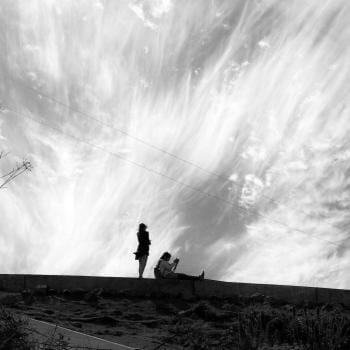Fr. Patrick (Paddy) Gilger SJ is a Jesuit priest of the Midwest Province. In addition to working as contributing editor for culture at America Magazine, he is pursuing a PhD in Sociology at the New School for Social Research. Fr. Paddy began what he thought would be a long term research trip to Italy at the end of February, only for his plans to be put on pause by the escalation of the Coronavirus pandemic. I asked Fr. Paddy a few questions about what he’s been learning from this unexpected turn of events, and what advice he has for those of us who are stuck at home indefinitely.
SA: What was the initial plan for your research trip, and how were you impacted by finding out that it wouldn’t work out as you thought?
PG: Well, a few years ago my Provincial, the superior of all the Jesuits in my region, asked me to do a doctorate and, since I have a vow of obedience, there was really only one answer I could give to that request. Having been overwhelmed by Charles Taylor’s magnificent A Secular Age during my theology studies, I knew that I wanted to study secularism in some form, but to be honest I didn’t know how to go about doing it. Through a series of really strange coincidences (or Providence, I suppose) I ended up in the sociology dept. at The New School for Social Research. I study sociology of religion there.
After a few years of working at it I’m finally — God willing — in the last stages of the research now. My dissertation, the writing of which I will dive into next year, is a study of the practices, strategies, and tactics through which religious identities are formed in our secular age. I’m trying to get a hold of that big idea by looking at the practices of three of the new ecclesial movements that have formed in the Church: the Focolare, Communion and Liberation, and Sant’Egidio.
So I’ve spent the last couple years studying about, participating in, and talking with members of these movements. Over that time I started to get the sense that, if I really wanted to understand them, I would need to go see the places where they began. And, since they’re all Italian, that meant heading to Italy. Which is how I ended up in Milan, where I am now. This is where Communion and Liberation was formed. I had initially hoped to study some Italian and to spend time with the movement here, but, well, the quarantine necessitated by the Coronavirus has put a stop to my research plans and has moved my Italian courses online.
SA: I can imagine it being extremely frustrating to have such an important project put on pause by an international pandemic. Though the old adage says that God works in mysterious ways, it becomes even more perplexing when his providence allows for a disruption to the work you believe he’s called you to do. What have your conversations with God looked like since arriving in Italy? How have you been making sense of God’s providence during these times?
PG: I have, I must admit, a complicated relationship with Providence. It’s not the *teaching* I struggle to obey — it’s not that it’s difficult to assent to, in other words — it’s that the whole concept stretches my imagination.
This is what I mean: for me the reality of evil, of the woundedness of the world, has crushed to dust the idea that “God has plan.” To dust. Completely — if (and this is a big “if”) what is meant by “God has a plan” is that there is a map of the world hidden somewhere in the mind of God and all we have to do is follow the path that has been marked out for us ahead of time. Coming close to pain (both my own and others’) has shown me the hollowness of that model. So, if that is what is meant by providence, then I do not, cannot, believe it. Because I cannot assent to the idea that God has willed (actively, not passively…) the existence of this kind of pain.
But I think there is another way, a more honest and more truthful way, to understand Providence. It goes something like this: if, instead of a map, we imagine Providence as a compass or a magnet — something that *pulls* us toward the true, the good, and the beautiful in every context… well that I can assent to. Because it resonates; I have lived it. In fact I think all human beings have. So, circling all the way back around to your question here, I have been on the lookout for the places, the people, the moments, the ideas, the realities in which God has been attempting to magnetically draw my attention. And there have been many, many of those places — in the people I am coming to know in my Italian classes which have continued online despite the quarantine, in the elderly Jesuits who have welcomed me into the high school where I am staying and who have made this empty place seem warm, in my prayer; in learning to drink these tiny cafe lungo’s from our Lavazza coffee machine instead of a giant Starbucks.
In many ways what I’m trying to say really comes down to a simple word: trust. Do I trust that, even when things happen that God has permitted (rather than actively willed), God is still at work drawing all things to himself? Sometimes I do. Sometimes. And those are great, great moments.
SA: It seems like it’s those moments in which God is trying to capture your attention that enables you to trust him, even when he allows us to experience such suffering and uncertainty. This echoes what Pope Francis highlighted in his homily for the Annunciation. Rather than offer an analysis of the Gospel reading, he simply stated, “we are facing a mystery. Perhaps the best thing we can do right now is reread the passage imagining Mary narrating the events that happened to her,” and he proceeded to read the passage a second time. Have there been any particular words or gestures of the Pope or one of your brother Jesuits that has “caught your attention”? And how have they helped you to face the mystery of this pandemic?
PG: It’s a wonderful question — the kind of question that the Jesuit practice of the Examen is really meant to help us notice and remain with. I wish I had a perfect story that I offer to respond to such a good question, but I don’t. Maybe my attention has been lacking! But I do have a couple moments to share.
The first a consistent experience I have been having with the superior of the Jesuit community here. His name is Fr. Giancarlo Bagatti — in all honesty if you’d like to imagine him you can picture any priest in a Scorcese film: mid-70’s, pompadour, genteel; wears his overcoat hanging from his shoulders. It’s incredible. But he’s also incredible. I don’t say that because of any one outstanding event, but because of his consistent patience with and acceptance of me. For example, my Italian is pretty terrible, and I can imagine how hard it must be, after a long day, to gather up the patience to ask me how I am. After all, I speak like a five year old; he has to slow down his words so that I will even understand. And never the less he never fails to ask. Being the recipient of such attention has itself caught my attention.
The other moment is more recent. Last Friday, the 27th, there were a couple of conflicts and the other Jesuits who normally celebrate mass here could not do so. And, at the last minute, the others who normally attend in our community had conflicts arise. This is not a problem, but I was left to celebrate the mass alone, which is rare for me. But I did. And I did so in a language I am only just getting comfortable with. And yet I have to say that it was one of the most beautiful experiences I’ve had at mass recently. I found my mind and heart flooded with memories of all these people who I love who are not able to attend mass as they regularly would. Quite spontaneously at the outset of the mass this desire welled up in me to offer that mass for those who are going without the Eucharist these days. So I did.
I’m not entirely sure, but it seems that the thread that ties these experiences together and is giving me a sense of where God is leading me in these times is not particularly grand, but it does feel deep. It seems he is saying something like this: “yes, your body, your movement, is constrained. But your heart, your attention, does not have to be. Give it generously to others. Listen to them and hear their needs and feel their fears. That is where life is.”
It’s almost like, since so many of my normal habits, my regular ways of distracting myself from what my heart is saying, have been swept away by the silence of the quarantine, that God’s desire for my attention to go outwards is coming through even stronger.
SA: That’s a really striking image—the body being constrained while the heart is free to move “generously.” I personally am finding the experience of the quarantine difficult because of how limited my means are to be available to those in need. I’m a high school teacher and am able to do my work from home and continue getting paid. I also have access to quality medical care and other resources, in addition to having time to pray and reach out to loved ones. I don’t feel at peace knowing how many are losing jobs or are truly alone without anyone to turn to. How can those who are more privileged begin to face the suffering faced by those on the material and existential peripheries?
PG: It’s such an important question. And I really don’t have a good answer (which always drives me crazy). Part of the problem, it seems to me, is that as Catholics we actually know how to go about serving the poor, how to encounter, how to listen and engage. It’s something we have so deep in our tradition — from St. Francis with the leper to Pope Francis at Lampedusa. But the thing I am finding most difficult about this situation is that proximity, the very thing that normally leads to healing and wholeness, is not an available tactic for us. It’s so strange.
Facing that strangeness is part of what is so difficult in this time — for me at least. Because I’ve grown accustomed to being able to turn to different parts of our tradition for answers as to how I ought to behave now. And the usual answers seem to be lacking. The thing that has been stirring up inside of me in the midst of this strangeness, however, is a desire to be more imaginative, more creative in how we learn to be people of proximity — of the Incarnation — at a time when distance is required of us.
So, I don’t have a perfect answer but I do have that desire. And, in the process of trying to mine the tradition for some new catalysts for my own imagination I came across this incredible paper. I mention it because, besides being a strong work of scholarship, it includes an example of how St. Charles Borromeo, who was bishop here in Milan from 1564 to 1584, responded to the crisis of the plague that now bears his name: the plague of San Carlo. What was amazing to me was learning that, after leading three immense processions through the streets of the city in the early days of the plague, Borromeo learned that it was proximity that spread the contagion. And when he became convinced of this he called a halt to them — he asked people to stay in their homes. Even more amazing was that, for Borromeo, stopping the processions did not mean stopping the prayer. Instead he had prayer books, librettos, printed and passed out to the people of the city. And he asked that the church bells of each parish be rung every few hours. Here is a record of what happened from a priest Paulo Bisciola, who was there during those years:
“[W]hen the plague began to grow, this practice [of singing the litanies in public] was interrupted, so as not to allow the congregations to provide it more fuel. The orations did not stop, however, because each person stood in his house at the window or door and made them from there […] Just think, in walking around Milan, one heard nothing but song, veneration of God, and supplication to the saints, such that one almost wished for these tribulations to last longer.”
That is the kind of imagination that I think God might be calling us to have in these times. Do I have it? In all honesty I would have to answer “no” to such a question. But it’s what I want. It’s a clear desire.
SA: This question of how we can be close to the suffering of others when we are supposed to be establishing a social distance is a poignant one. But maybe, as you indicated, this is an invitation to us to discover anew what it means to be believers in the incarnate God. Of course the Church’s Tradition offers us a plethora of ways to draw near to the flesh of Christ through the members of his Body. This is a decisive moment, then, for us to ask whether the Tradition we follow is a static set of beliefs and practices, or if it is the “spring of living water” which Jesus speaks of. I have to say that I’m impressed by people who, similarly to St. Charles Borromeo, are allowing the Holy Spirit to manifest new and creative gestures of charity during this difficult time. I see the Spirit moving in my own high school, where teachers are coming up with innovative ways to use technology to foster a sense of community among our students. Everyday, I see the ideas parish communities are coming up with, like drive thru adoration, or taping photos of parishioners to the pews. I personally have been helped by calling a group of friends on Zoom every night to pray the rosary, and by watching the Pope’s impromptu Urbi et Orbi address with some of my students.
You’ve offered us a beautiful example of how one can begin to face the interruption to “planned programming” brought on by the pandemic. I know I’ll be meditating on many of these thoughts here during my time in prayer. Can you leave us with some last insights, perhaps from Ignatian spirituality, on how we can make the most of our time during the quarantine?
PG: Thank you, Stephen. I thought the Urbi et Orbi was a perfect example of that kind of imaginative response as well.
I think the most important insight I can offer is an extension, or a reframing maybe, of Ignatius’ famous Suscipe prayer. In the usual English translation, it begins: “Take, Lord, receive, all my liberty, my memory, my understanding; my entire will.” It’s two of those first three words that have been ringing out for me these days: take and receive.
They have because I think Ignatius is very careful with what he says to God here. The two Latin words that are used here are “suscipe” and “accipe” which mean “receive” and “take,” respectively. (Although both have “taking” connotations “suicipe” leans more toward petitioning someone to take up something while “accipe” means “to take” more directly.) But the key for me is what, by using these words, Ignatius chooses not to say. That is, he does not say “I give you.” He doesn’t, in other words, make himself the subject, the actor, of the prayer. Instead he asks God to act, and to act by taking from him, or lifting up from him, his freedom, his memory, his whole will. It’s like Ignatius knows that his own capacities are not sufficient for giving such precious things.
And it’s right there that we might have an analogy to our own situation. Our own freedom has been taken from us. We are being asked, during this quaresima, to stay in place, to be quarantined. And in so doing we are taking up a penance that we didn’t choose. The thing that, I think, we can learn from Ignatius is that there is a way to offer even that which we are incapable of giving to the Lord. So, perhaps we’re feeling anxious or sad or angry at the constraints under which the pandemic requires us to live. Maybe we are. But we don’t need to be capable of offering this loss of freedom to God by ourselves. We don’t need to have such strength.
All we need is to be able to do is to ask for help — to ask God to take from us what we are not capable of giving. That has been much of my prayers these days, asking God to do for me what I am not capable of doing myself: to take my resistance to this loss of my freedom, to help me accept what has been taken from me, and to help me imagine what it might look like to love under these unchosen constraints.












